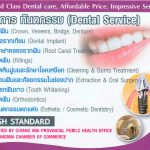Oral Surgery
An oral surgeon is a dentist who specializes in different aspects of surgery both in and around the mouth. They diagnose and treat defects, injuries, and diseases involving the head, mouth, teeth, gums, jaws, and neck.
Here at the Silom Dental Building we have developed procedures to remove teeth painlessly and an emphasis on saving as much of the supporting bone and gum tissues as possible. This is important because strong structures provide essential support for your implants, bridges, or dentures leading to the best possible functional and cosmetic results. An oral surgeon can carry out a wide range of procedures. We have outlined some of the more commonly practiced procedures below.
Oral Surgery
A number of conditions may require oral surgery, including:
Impacted Teeth
Wisdom teeth, otherwise known as third molars, are the last set of teeth to develop. Sometimes these teeth emerge from the gum line and the jaw is large enough to allow room for them, but most of the time, this is not the case. More often, one or more of these third molars fails to emerge in proper alignment or fails to fully emerge through the gum line and becomes entrapped or “impacted” between the jawbone and the gum tissue. Impacted wisdom teeth can result in swelling, pain, and infection of the gum tissue surrounding the wisdom teeth. In addition, impacted wisdom teeth can cause permanent damage to nearby teeth, gums, and bone and can sometimes lead to the formation of cysts or tumors that can destroy sections of the jaw. Therefore, dentists recommend people with impacted wisdom teeth have them surgically removed.
It”s not just wisdom teeth that sometimes become impacted and need to be removed. Other teeth, such as the cuspids and the bicuspids can become impacted and can cause the same types of problems described with impacted wisdom teeth.
Tooth Loss
Dental implants are an option for tooth loss due to an accident or infection or as an alternative to dentures. The implants are tooth root substitutes that are surgically anchored in place in the jawbone and act to stabilize the artificial teeth to which they are attached. Suitable candidates for dental implants need to have an adequate bone level and density, must not be prone to infection, and must be willing to maintain good oral hygiene practices.
Jaw-Related Problems
- Unequal jaw growth. In some individuals, the upper and lower jaw fail to grow properly. This can cause difficulty in speaking, eating, swallowing, and breathing. While some of these problems — like improper teeth alignment — can be corrected with braces and other orthodontic appliances, more serious problems require oral surgery to move all or part of the upper jaw, lower jaw, or both into a new position that is more balanced, functional, and healthy.
- Improve fit of dentures. For first-time denture wearers, oral surgery can be done to correct any irregularities of the jaws prior to creating the dentures to ensure a better fit. Oral surgery can also help long-term denture wearers. Supporting bone often deteriorates over time resulting in dentures that no longer fit properly. In severe cases, an oral surgeon can add a bone graft to areas where little bone remains.
- Temporomandibular joint (TMJ) disorders. Dysfunction of the TMJ, the small joint in front of the ear where the skull and lower jaw meet, is a common source of headache and facial pain. Most patients with TMJ disorders can be successfully treated with a combination of oral medications, physical therapy, and splints. However, joint surgery is an option for advanced cases and when the diagnosis indicates a specific problem in the joint.



